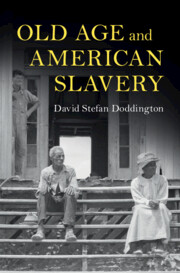Book contents
- Old Age and American Slavery
- Cambridge Studies on the American South
- Old Age and American Slavery
- Copyright page
- Dedication
- Contents
- Figures
- Tables
- Acknowledgments
- Introduction
- Part I The Enslaved
- 1 “As to those more advanced in life”
- 2 “Old and broken now; no tongue can tell how much I suffer”
- 3 “Young people think that old people are fools but old people know that young people are fools”
- 4 “Don’t kill such an old creature as I”
- 5 “You wont notice me now but you’ll wish you had”
- 6 “The summer of my life was passing away”
- Part II Enslavers
- Bibliography
- Index
6 - “The summer of my life was passing away”
Resistance, Old Age, and Surviving Slavery
from Part I - The Enslaved
Published online by Cambridge University Press: 27 October 2023
- Old Age and American Slavery
- Cambridge Studies on the American South
- Old Age and American Slavery
- Copyright page
- Dedication
- Contents
- Figures
- Tables
- Acknowledgments
- Introduction
- Part I The Enslaved
- 1 “As to those more advanced in life”
- 2 “Old and broken now; no tongue can tell how much I suffer”
- 3 “Young people think that old people are fools but old people know that young people are fools”
- 4 “Don’t kill such an old creature as I”
- 5 “You wont notice me now but you’ll wish you had”
- 6 “The summer of my life was passing away”
- Part II Enslavers
- Bibliography
- Index
Summary
This chapter provides a challenge to enduring arguments about the unifying nature of resistance by enslaved people in the US South by emphasizing intergenerational conflict in the context of fight or flight. Scholars have commonly argued that, while not as likely to flee themselves, elders were elevated and praised for their roles as guides in offering advice and support – both moral and practical – or by simply upholding the solidarity of the slave community. This chapter reveals instead how elders were held up as negative influences by those who chose to fight or take flight. Whether in counselling against direct resistance, appearing resigned to bondage, or actively conspiring against rebels and runaways, enslaved elders could be portrayed by their younger peers as people who had been unwilling to make the ultimate sacrifice for freedom. These were men and women who had survived slavery, but they had not resisted, and this distinction had personal and political implications for contemporaries.
Keywords
- Type
- Chapter
- Information
- Old Age and American Slavery , pp. 195 - 222Publisher: Cambridge University PressPrint publication year: 2023

